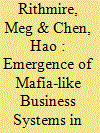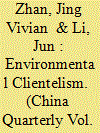| Srl | Item |
| 1 |
ID:
183235


|
|
|
|
|
| Summary/Abstract |
A large body of literature on state–business relations in China has examined the political role of capitalists and collusion between the state and the private sector. This paper contributes to that literature and understanding of the internal differentiation among China's business elites by documenting the emergence of a particular kind of large, non-state business group that we argue is more akin to a mafia system than any standard definition of a firm. Drawing on large-N descriptive data as well as deep ethnographic and documentary research, we argue that mafia-like business systems share organizational principles (plunder and obfuscation) and means of growth and survival (relations of mutual endangerment and manipulation of the financial system). Understanding the particular moral economy that underlies mafia-like business systems and their interactions with the state challenges methodological foundations of research on China's political economy and helps to explain recent conflict between high-profile business people and the state.
|
|
|
|
|
|
|
|
|
|
|
|
|
|
|
|
| 2 |
ID:
192627


|
|
|
|
|
| Summary/Abstract |
China's environmental crackdowns under Xi Jinping have led to a sweeping shutdown of private enterprises. To circumvent this, enterprises have developed different survival strategies including direct lobbying to government officials and indirect lobbying through business associations. Based on comparative case studies of environmental lobbying in Chinese cities, our research finds that larger enterprises, enjoying more economic leverage, tend to lobby directly using their own political connections to sway environmental enforcement. By contrast, smaller enterprises are excluded from these clientelist networks and have to lobby through business associations, the effectiveness of which hinges on the support of large enterprises. Therefore, we argue that although the Chinese government's increasingly stringent environmental policies have shrunk the lobbying (and living) space for private enterprises, the existence of environmental clientelism protects economically powerful and politically connected private enterprises but sacrifices the others in the implementation of environmental policies.
|
|
|
|
|
|
|
|
|
|
|
|
|
|
|
|